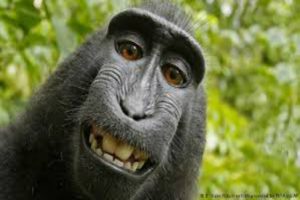United States Court of Appeals (Ninth Circuit): While deciding the issue that whether a monkey may sue humans, corporations, and companies for damages and injunctive relief arising from claims of copyright infringement, Carlos T. Bea and N. Randy Smith, Circuit Judges, and Eduardo C. Robreno, District Judge, held that the monkey in particular and all the animals in general, by the virtue of the fact that they are not humans, lack the statutory locus standi under the Copyright Act, even though they have a constitutional standing under Article III of the United States Constitution.
The issue revolves around Naruto, a crested macaque living on the island of Sulawesi, Indonesia. In 2011, the monkey picked up the camera of wildlife photographer David Slater, and took several photos of himself; the collection which later became popular as “monkey selfies”. The pictures were later published in Slater’s book, which identified Slater and Wildlife (magazine published by Wildlife Personalities, Ltd.) as the copyright owners of the Monkey Selfies. However a copyright infringement case was filed against Slater and Wildlife, by People for the Ethical Treatment of Animals (PETA) as “Next Friends” on behalf of Naruto. PETA claimed that that the monkey was the author and owner of the photographs and had suffered concrete and particularized economic harms.
Perusing the facts and the argument, the Court deliberated upon the constitutional and statutory locus standi of Naruto; and whether PETA qualifies to be the “Next Friend” of the monkey. It was observed by the Court that PETA has failed to allege any facts to establish the required significant relationship between a next friend and a real party in interest and; an animal cannot be represented, under US laws, by a “next friend.” Thus PETA cannot sue on behalf of the monkey. Resolving the question of constitutional and statutory standing, the Court relied upon their decision in Cetacean Community v. Bush, 386 F.3d 1169 (9th Cir. 2004), and observed that Naruto’s lack of next friend does not deprive him of a constitutional standing under Article III. However vis-à-vis the Copyright Act, it was noted that if an Act of Congress clearly states that animals have statutory standing, then animals will have statutory standing; and if the statute does not state, then animals do not have statutory standing. The Copyright Act does not expressly authorize animals to file copyright infringement suits under the statute; therefore Naruto cannot sue for copyright infringement. [Naruto v. Slater, No. 16-15469, opinion dated 23.04.2018]

